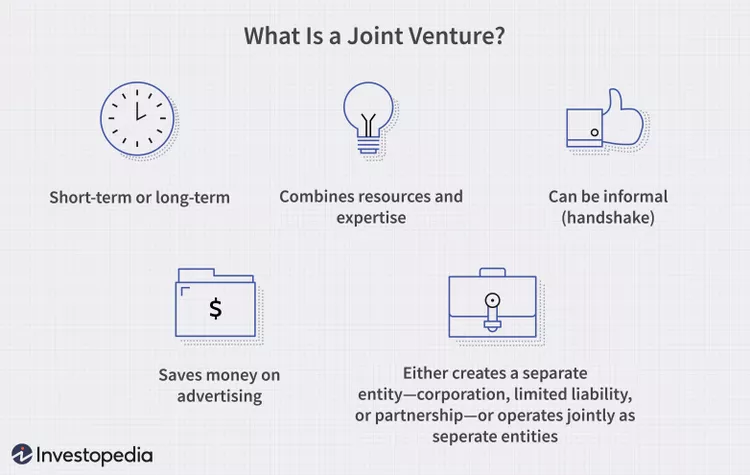Joint Venture
What is a Joint Venture?
Definition:
A Joint Venture (JV) is a business arrangement in which two or more parties come together to collaborate on a specific project or venture, combining their resources, expertise, and capital. The purpose of a joint venture is to pursue mutual business goals while sharing the associated risks and rewards. Joint ventures can take various forms, including partnerships, limited liability companies, or separate legal entities, and they are often established for a finite period or until a specific objective is achieved.
Analogy:
Consider a joint venture as a partnership in a dance competition. Just as dance partners collaborate, bringing their unique skills and styles to create a synchronized and impressive performance, businesses in a joint venture collaborate to leverage their strengths and achieve shared business objectives.
Further Description:
Joint ventures involve several key components:
Objective Clarity: Clearly define the goals and objectives of the joint venture, ensuring that all parties have a shared understanding of what they aim to achieve.
Resource Contribution: Each party contributes resources such as capital, technology, expertise, or assets, leveraging the strengths of all involved entities.
Legal Structure: Determine the legal structure of the joint venture, whether it’s a contractual agreement, a separate legal entity, or another structure that aligns with the goals and preferences of the collaborating parties.
Risk and Reward Sharing: Outline the distribution of risks and rewards among the partners, establishing a fair and equitable framework for sharing both the benefits and potential challenges.
Governance Structure: Define the governance structure of the joint venture, including decision-making processes, management responsibilities, and dispute resolution mechanisms.
Duration and Exit Strategy: Specify the duration of the joint venture and establish an exit strategy, detailing conditions under which the venture can be terminated or renewed.
Communication and Transparency: Foster open communication and transparency among the joint venture partners to ensure a collaborative and trusting relationship.
Why is Joint Venture Important?
Risk Mitigation: Joint ventures allow businesses to share risks and pool resources, reducing the financial burden on individual entities.
Access to New Markets: Collaborating with local partners in a joint venture provides access to new markets, customers, and distribution channels.
Technological Advancements: Joint ventures enable companies to combine their technological expertise, fostering innovation and advancements that may be challenging to achieve independently.
Cost Efficiency: Shared resources and costs in a joint venture can lead to increased cost efficiency and economies of scale.
Global Expansion: Joint ventures are a strategic approach for companies looking to expand globally, leveraging the local knowledge and networks of their partners.
Examples and Usage:
Sony Ericsson (Sony and Ericsson): Sony Ericsson was a joint venture between Sony Corporation and Ericsson. It allowed both companies to collaborate on the development and marketing of mobile phones, combining Sony’s consumer electronics expertise with Ericsson’s telecommunications technology.
Hulu (NBCUniversal, Fox, Disney, and Time Warner): Hulu is a joint venture among major media companies, providing an online streaming platform. The collaboration allows these companies to compete in the digital streaming market collectively.
Renault-Nissan-Mitsubishi Alliance: The Renault-Nissan-Mitsubishi Alliance is a global strategic partnership that involves three automotive manufacturers collaborating on various aspects, including research and development, production, and marketing.
Key Takeaways:
- Clearly define joint venture objectives to ensure a shared vision among collaborating parties.
- Contribute resources and expertise to leverage the strengths of each party involved.
- Establish a legal structure, governance framework, and transparent communication channels to facilitate effective collaboration.
- Share risks and rewards equitably, fostering a fair and mutually beneficial partnership.
- Consider joint ventures as strategic tools for risk mitigation, accessing new markets, promoting technological advancements, achieving cost efficiency, and facilitating global expansion.





